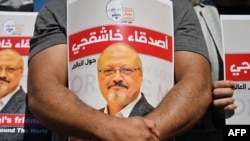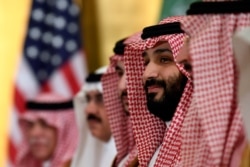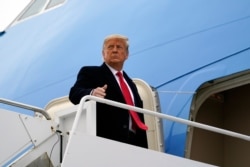With the new Biden administration in place, calls have increased for the U.S. government to release an unclassified report into the killing of Washington Post columnist Jamal Khashoggi.
The head of the U.S. House of Representatives Intelligence Committee last week called on Director of National Intelligence Avril Haines to release an unclassified report into the Saudi journalist’s killing without delay. The request followed Haines’ commitment to do so during her confirmation hearing earlier this month.
In a letter to Haines last Friday, Representative Adam Schiff, a Democrat from California, pressed the Office of the Director of National Intelligence (ODNI) to produce an unclassified report to Congress regarding “Saudi Arabia’s culpability for the brutal, premediated murder of Washington Post journalist and U.S. resident Jamal Khashoggi.”
Khashoggi, a well-known critic of the Saudi government, was killed and dismembered on October 2, 2018, while visiting the country’s consulate in Istanbul, Turkey.
During Haines’ confirmation hearing, Senator Ron Wyden, a Democrat from Oregon, asked whether she would submit to Congress an unclassified national intelligence report on Khashoggi’s slaying, as stipulated by the 2020 National Defense Authorization Act (NDAA). Haines replied, “Yes, Senator, absolutely, I will follow the law.”
A CIA assessment shortly after Khashoggi’s death concluded that the killing was likely carried out on the orders of Saudi Arabia’s Crown Prince Mohammed bin Salman, according to media reports at the time.
A subsequent investigation by Agnés Callamard, the U.N. special rapporteur on extrajudicial, summary or arbitrary executions, determined that Saudi Arabia was responsible and there was "credible evidence" to warrant an investigation into the crown prince and other high-level Saudi officials.
Salman has denied any direct involvement. Saudi Arabia convicted eight men in connection with the crime, described by Saudi officials as a “rogue operation.”
Path to justice
Human rights groups have been pushing for the declassification of U.S. intelligence on the case as key means to advance justice.
“The first step towards holding the murderers accountable is transparency about who was responsible,” said Amrit Singh, a human rights lawyer at the Open Society Justice Initiative.
The justice and rights organization in 2019 filed a lawsuit seeking the release of intelligence on Khashoggi’s killing. “Thus far the Trump administration did not release a single meaningful record on the murder,” she told VOA.
“The U.S. intelligence community has been leaking for years that they essentially believe with high confidence that [the crown prince] ordered the assassination,” said Adam Coogle, deputy director of Human Rights Watch’s Middle East division. “We don’t really know the context of that claim beyond some speculation, but if we release [the intelligence report] fully, we may learn new information."
Establishing who was behind the killing would be a major breakthrough in the impunity that persists in this and other journalist killings.
A 2020 UNESCO report on journalism safety and impunity found only 13% of cases globally involving crimes against journalists have been resolved.
“The [intelligence] report will allow us to focus on those who are at the top of the chain of command,” said U.N. rapporteur Callamard. “It will send a very clear signal that no one can escape scrutiny and accountability even if they are a quasi-head of state.”
Legal obligations
Under the 2020 NDAA, the national intelligence office was required to report on information identifying “those who carried out, participated in, ordered, or were otherwise complicit in or responsible” for Khashoggi’s death 30 days after the enactment of the law, meaning that the report should have been made public last February.
Instead, Singh of the Open Society Justice Initiative said, the Trump administration gave select members of Congress a classified document. Releasing an unclassified national intelligence report, she said, “is long overdue.”
The Office of the Director of National Intelligence cited security concerns when it declined to provide the report. Human rights advocates say those concerns could have been resolved through reasonable redactions.
The fact that the last U.S. administration did not share intelligence despite its obligations under the 2020 NDAA and other levers employed by Congress has fueled questions about whether it acted to protect the crown prince and the Saudi state.
During interviews with Bob Woodward for Rage, the veteran journalist’s book on the Trump administration, Trump said he was “able to get Congress to leave [bin Salman] alone.”
“The American people have the right to know what its government did,” Singh said.
Releasing the intelligence would serve as a statement that rule of law will outweigh political interests under the administration of President Joe Biden, analysts say.
“The way [Haines] put it — that she is going to do it because it is the law — is very important,” Callamard said. “Through her response she is making a commitment to American democracy.”
Omid Memarian, communications director for Democracy for the Arab World Now (DAWN), said that what the U.S. decides to do with its intelligence report could be a game-changer for other dissidents, journalists and activists from Saudi Arabia.
The release could have a domino effect throughout a region known for its abuse and intimidation of government critics, Memarian said.
Khashoggi founded the rights organization DAWN shortly before his death to expose human rights violations.
“If the U.S. decides to withhold the Khashoggi report, it will send a signal to the Saudi government to stay the course: to keep targeting human rights advocates, to keep breaching international human rights norms,” Memarian told VOA. “Such moral cowardice in the world's most powerful nation has a tangible, real-world effect."
Releasing the report and holding the perpetrators accountable “would cause Saudi Arabia to pause before it next considers butchering its political opposition,” Memarian said.
Other authoritarian regimes will take note, Memarian said, adding, “If billions of Saudi petrodollars can't save [the crown prince], then Iran, Egypt and other regional autocracies will understand that sooner or later, they also will be held accountable for crushing dissent.”




